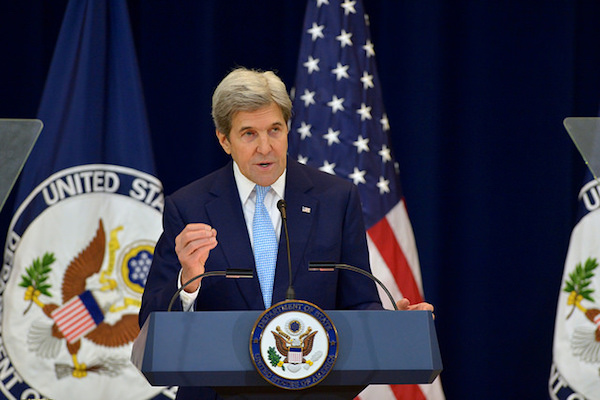The Secretary of State asked if they really wanted to live with the moral consequences of a one-state reality. He doesn’t understand this isn’t an issue that preoccupies the average Jewish citizen of Israel.

Over the past three decades Israel has seen seven prime ministers (and several more elections), political assassinations, two intifadas, a peace accord, four wars and the withdrawal of the Jewish settlers from Gaza. But amidst all this upheaval, one essential fact has remained a constant: Israel has maintained complete control over the lives of the Palestinians who live in Gaza and the West Bank.
On Wednesday, an exhausted-looking John Kerry gave what will probably be his final foreign policy speech. It was perhaps fitting that he focused on one of the Obama administration’s greatest diplomatic failures — the Israel-Palestine issue.
In his speech, Kerry asked Israelis if they understood the implications of continuing their military occupation of the Palestinians indefinitely. Over the course of more than an hour, he tried appealing to Israelis’ values: were they willing to reconcile themselves to living in a de facto apartheid state? This is a question that Israelis have heard so many times, that it has lost its meaning.
When it comes to the Palestinians, the national discourse is so hardwired that even Israeli Jews who identify as liberals consider bedrock principles like humanity, rights and ethics to be lofty luxuries. When liberal and right-wing Israelis debate whether or not the occupation should end, they don’t argue over how the occupation affects Palestinians. They talk about whether the occupation is good or bad for the Jews. Only a tiny minority of Israeli Jews are detached from the nationalist narrative and focused on the human rights of Palestinians, rather than the national well-being of the Jews.
As several analysts have pointed out*, Kerry did not say anything new in his speech. He reiterated the U.S. government’s opposition to the settlements, which are illegal according to international law. This has been the policy of every U.S. administration, without exception, for nearly 50 years. Nor has the Obama administration deviated from the practice of previous administrations in allowing the settlements to multiply and expand while offering toothless criticism or issuing shocked-and-appalled statements.
Kerry also stuck to the tradition of U.S. officials in emphasizing his love of Israel, by offering anecdotes to illustrate his knowledge of the place and his identification with the people. Imagine a U.S. official giving a speech in which he talks about his love for Palestinian landscapes, his appreciation of Palestinian culture, his warm relations with famous Palestinian officials and intellectuals, and his knowledge of Palestinian history.
It’s terribly sad that just in saying the word “nakba” — in acknowledging the tragedy of the mass Palestinian displacement of 1948 — Kerry broke new ground. We’ve never heard a U.S. official say that word before. We should not get excited over these little crumbs of humanization, and yet we do.
Kerry’s blunt assertion that if Israel were to choose a one-state scenario it would have to be “either democratic or Jewish, but not both” is not new either. It’s just something we don’t hear from U.S. officials all that often. And it’s also not really true: democracies are imperfect and not all of them have always enfranchised all their citizens. In fact, most of them did not, for most of their histories.
The United States was founded as a democracy 240 years ago, but prevented blacks and women from voting until well into the 20th century. Democracies that keep large segments of their populations disenfranchised are now considered ethically dubious at best, but perhaps Israelis are willing to trade ethics for a perception of physical security. They would not be alone or unique in their willingness to compromise out of fear and racism. Look at the United States after 9/11.
The tragedy of Kerry’s speech lies also in the implicit understanding that it came at least a decade too late.
Benjamin Netanyahu has positioned himself to stay in power for many years to come. Under his influence, the political discourse in Israel has shifted so far to the right that it’s impossible to identify any significant difference between the left-of-center parties’ statements on the occupation and those of the government.
Israelis are not feeling any pain from the occupation and they probably won’t feel it again, as long as the army remains powerful and the global neoliberal economy continues to chug along, with Israel offering goods, services and technology that other countries want to purchase or invest in. And now with an incoming Trump administration, which demonstrably is not at all concerned about the basic values of democracy (quite the contrary), the Netanyahu government won’t even have to worry about being scolded for continuing to entrench its settlement of the West Bank — while pretending it has no control over the humanitarian crisis in Gaza.
So what’s the significance in Kerry’s speech? It’s mostly symbolic, as David Remnick explains in his superb analysis for the New Yorker. Left and right seem broadly to agree that the two-state solution is dead. For liberals who subscribe to the national ideology of Zionism, this is a tragedy. For the Jewish religious national right, their Christian evangelical supporters and Tea Party types, this is a triumph.
The rest of us are wondering what comes next. Meanwhile, for most outside observers the issue of Israel-Palestine is boring at best and insulting at worst, given the ongoing carnage in bordering Syria, in Yemen and in Iraq, and given the global refugee crisis. The world’s attention has moved on, and the country that receives half the United States’ foreign military aid, not to mention a generous increase in its annual “allowance” over the coming decade, is sounding like a spoiled brat. As Kerry said, the Americans cannot prevent Israel from careening toward a one-state reality. But they don’t have to support it.
*Additional reading on Kerry’s speech (updated):
In John Kerry’s Mideast Speech, A Clash of Personalities and Policies, by Peter Baker for the New York Times
Kerry’s bombshell Israel speech is one of the most puzzling things I’ve seen in politics, by Matty Yglesias for Vox
The entire transcript of Kerry’s speech; watch it here on video.
Kerry’s Eulogy for Peace Marks the Transition from No-drama Obama to Twilight Zone Trump, by Chemi Shalev for Haaretz.
Noura Erakat on CNN
Diana Buttu and Gideon Levy on Democracy Now
John Kerry and Israel: Too Little and Too Late, by Rashid Khalidi for the New York Times.
Hanan Ashrawi on CNN
John Kerry’s Eureka Moment, by Mouin Rabbani for the London Book Review

